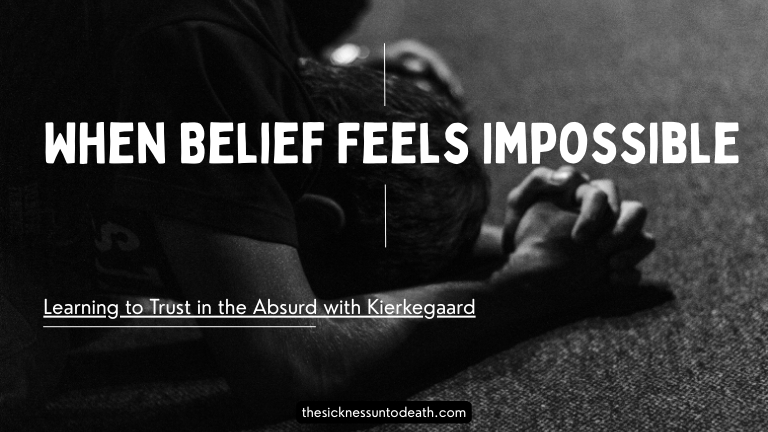Analyse Kierkegaard’s concept of the “absurd” and how it helps modern individuals make peace with uncertainty and faith.
There are moments when faith feels impossible.
Maybe it’s after a loss. Or in the middle of a quiet season where your prayers go unanswered. Maybe it’s the constant hum of doubt, or the feeling that belief just doesn’t make sense anymore—not in the face of suffering, injustice, or the sheer weight of everyday life.
In those moments, it’s easy to think you’ve failed. That faith has slipped through your fingers.
But Søren Kierkegaard, the 19th-century Danish philosopher and theologian, would say something different.
He believed that real faith doesn’t begin where logic ends. It begins where it seems absurd to believe at all.
What Does Kierkegaard Mean by the “Absurd”?
Kierkegaard often spoke about faith as a paradox. He called it a “leap into the absurd”—not because faith is irrational, but because it often requires trusting in something we can’t fully explain, control, or understand.
“Faith is precisely the contradiction between the infinite passion of the individual’s inwardness and the objective uncertainty.”
In simpler terms? It’s choosing to trust in something higher—even when it doesn’t make complete sense.
To Kierkegaard, this isn’t naive. It’s courageous.
Faith in a World That Craves Certainty
Let’s face it—modern life doesn’t leave much room for mystery. We’re taught to rely on facts, results, and data. We Google everything. We want answers, clarity, and control.
But the problem is… life isn’t always logical. Things fall apart. People we love suffer. Justice doesn’t always prevail. And when life feels deeply unfair, belief can feel downright absurd.
Kierkegaard understood this tension. He didn’t ask people to deny it. Instead, he invited them to live with it—to step into the uncertainty and still say, yes, I choose faith.
Not because it’s easy. But because it’s real.
Belief Isn’t Always Clean—or Comfortable
Kierkegaard’s idea of the absurd challenges the kind of faith that needs everything to make sense. It makes space for doubt, grief, and contradiction, while still holding fast to hope.
He saw belief as deeply personal—not a set of rules to follow, but a lived commitment that often defies human understanding.
“To believe is to lose the understanding in order to gain God.”
And maybe that’s what makes it so powerful.
How This Helps Today
If you’re someone who’s struggling with belief—or feeling disconnected from the version of faith you once held—you’re not alone.
Kierkegaard’s work offers comfort not through easy answers, but through deep empathy. He gives permission to question, wrestle, and still hold on. He reminds us that it’s possible to be uncertain and faithful at the same time.
That kind of faith isn’t weak—it’s honest.
And in today’s world, honesty might be the most sacred thing of all.
Final Thoughts: Making Peace with the Absurd
Faith doesn’t always look like confidence. Sometimes it looks like standing in the middle of the unknown and choosing to hope anyway.
Kierkegaard called that the absurd. But maybe what he really meant was: this is what it means to be human. To be fragile, to not know, and still to believe.
Want to Go Deeper?
📖 If this resonates with you, visit www.thesicknessuntodeath.com
It’s home to a modern, accessible take on Kierkegaard’s most powerful work—a guide for anyone searching for meaning, especially when belief feels messy, impossible, or painfully real.
Whether you’re questioning your faith, clinging to it, or rebuilding it from the ground up, The Sickness Unto Death offers a path. Not to certainty—but to honest, inward, courageous belief.

